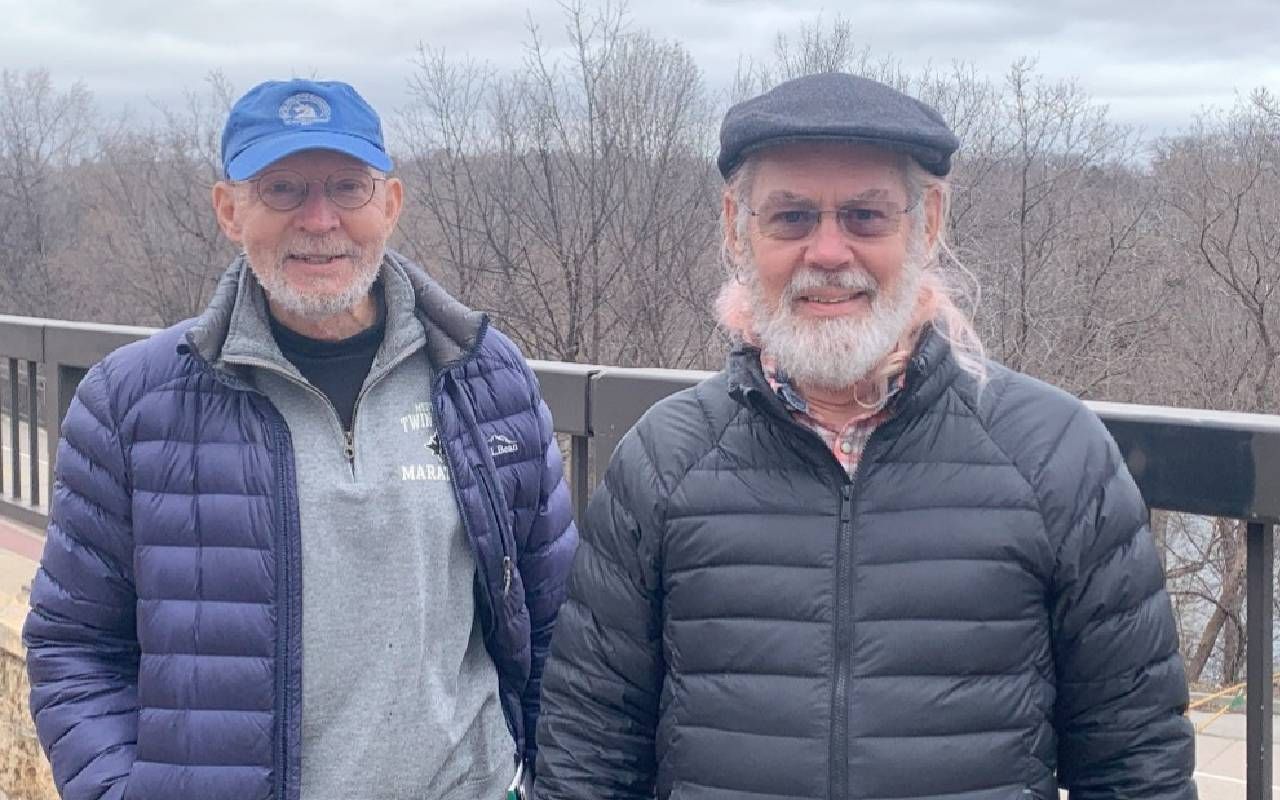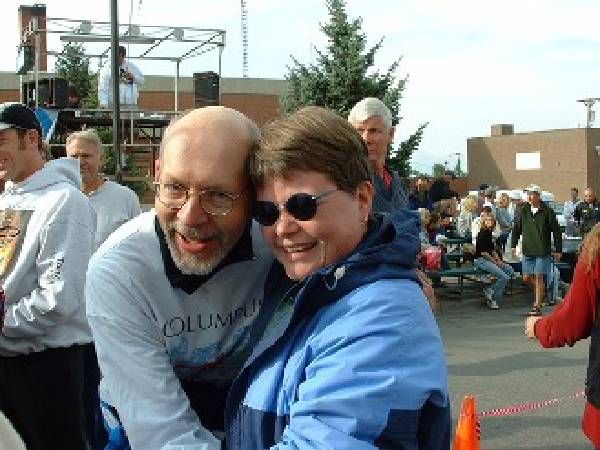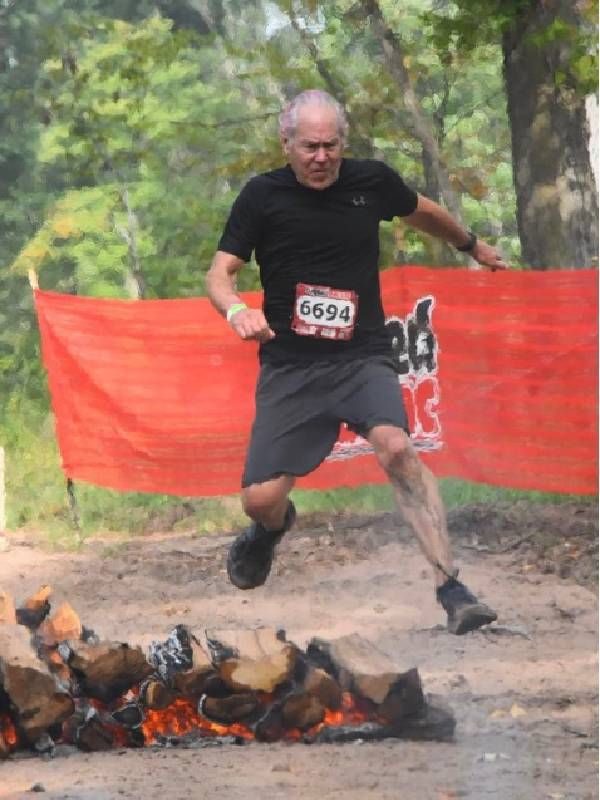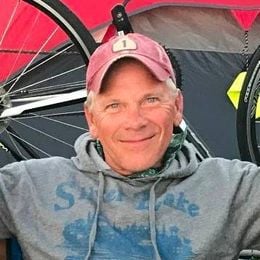'On Two Strong Legs' - A Conversation About Running
For these older athletes, the data on running isn't as important as the lessons learned and the gratitude for strong bodies
I got out of bed
on two strong legs.
It might have been
otherwise…
("Otherwise" by Jane Kenyon)
I'm seated at a booth at my local diner with two friends. Mark Kreitzer (70) has a twinkle in his eye and shoulder-length hair of a pinkish color (he and his granddaughter dye their hair the same color on their birthdays). Greg Taylor (77) is lean and wiry — with a look of experience and a sharp sense of humor. As the spring training season is here, the three of us, all Twin Cities residents, are talking about running practice — and since I am no longer able to run, it is making me a bit wistful.

Greg has run an amazing 156 marathons (including 28 finishes at the Boston Marathon) while Mark (who took up running during the pandemic) will be attempting his first marathon this coming October to celebrate the beginning of his 8th decade.
To set the context, very few people — less than .2% of the US population — have run a marathon. If we look at senior runners, the numbers are even smaller — runners over 70 make up only a little more than 1% of all marathon finishers. That said, the fastest growing age group of marathoners is runners over 90!
Lessons from Running
When runners talk about running, the conversation will likely include a lot of metrics, at least initially; they will talk about mileage and pace, courses, favorite races. But as they talk, the conversation may go in another direction. They may start talking about what they've learned about themselves and how they have been changed by running. Spending a lot of time running means spending a lot of time alone with your thoughts.
Over the years it became part of my body and then it became part of my identity.
I was a serious runner for over thirty years, between my 30th birthday and the day in my early sixties that I realized that my left knee just wasn't ever going to be able to do it anymore. (I then took up long distance cycling.)
In those three decades, I raced hundreds of times at distances from the mile up to my 17 marathons — I ran an average of 1,000 miles each year. I carefully logged all my runs and race times and yes, I have a spreadsheet. Even as I would review the analytics, though, I knew that running was about more than numbers and performance, that there was something less quantifiable and more essential about it.
Over the years it became part of my body and then it became part of my identity. It changed my bones and muscles, my heart and my lungs — it made me stronger and leaner. Eventually, it changed my soul. I not only was able to manage the challenge of a workout, I came to love the sensuality of the run. I relished the sweatiness in the summer and the smugness I felt after a workout on a cold winter day.
I also loved my after-run routine: a shower and putting on soft well-worn jeans, warm socks and my favorite old sweatshirt, feeling muscles relaxing after being used well. It felt as though my body was grateful, and I, too, felt gratitude for a strong body. As the late poet Jane Kenyon writes, it might have been otherwise.
Greg's Story
Greg grew up in Chicago and as a kid, walked frequently but only ran "to survive, to get through the day without being beat up … my expectations were always just to get by … " He noted that some kids are born into families where it is expected that they will do well, and those kids end up having high expectations of themselves, but that was not his experience.
Clearly, Greg now loves running and he enjoys the camaraderie of the marathon — it's a celebration for him, every time. He says, "I love it when I'm high fiving someone half my age — we are kindred spirits!"

I began with a question for Greg: "How have you been able to do it? Is there something different about your body?" His response set the tone for the entire conversation. He said "Well, it is a tale of two cities…[my body] presents well, but it carries a heavy load of grief, three different forms of cancer, heart disease and a mild stroke … I feel like I'm at the edge of a cliff and I have to keep running or I'll fall off…primarily, I'm just lucky and I mean that across the board."
His legs still work well mechanically, and since he didn't play sports in high school, he does not have the old injuries that many former athletes suffer. (He also noted that his body is occasionally like a "surly teenager" that needs a talking to — even in the middle of a race.)
Most of us who have lived into our seventies have experienced grief and pain, both in our bodies and our spirits. But the solitude and meditativeness of running can be a great solace — Greg says "my only solace ... you might say I'm running away from my traumas" — particularly after the loss of his wife and soulmate, Linda, in 2019.
Mark's View on Running
The question of expectations came up with Mark, as well. When I asked about his goal for the race, he said it was simply to finish, which is an excellent goal for a first-time marathoner.
Thinking too much about achievement can be an impediment for the amateur athlete. It reminded me of the Zen notion of "beginner's mind" about which the roshi Shunryu Suzuki wrote in "Zen Mind, Beginner's Mind: "When we have no thought of achievement, no thought of self, we are true beginners. Then we can really learn something."
"I'm more disciplined and braver than I thought I was...age is a made-up thing – I feel like I'm 35."
Both Mark and Greg noted the similarities between meditation and running. Further, in the process of training for the marathon, one learns that "if I can do this, I can do anything" or, as Mark said, "from one thing I can learn 10,000 things."
Mark has been working with a trainer since the pandemic and his daily workouts have lowered his weight by 40 pounds in the last few years. He is looking to "do something big" to mark his milestone year. He is not alone — research shows that we are 10 to 13% more likely to do something notable when we turn into a new decade. (I climbed Mount Rainier the year I turned 30 – in fact, I began running to train for the climb, and ended up loving running more than mountain climbing.)
What we do on those milestone years sometimes becomes a habit — as Bill McKibben has written, "Most of the long chain of gurus, cranks and messiahs that have illumined human civilization have agreed on one point: that it's what you do every day, day in and day out, that forms who you are. Not what you do on special occasions."

Mark, by the way, has no plans to do a second marathon, at least not as of this writing — many marathoners have gone from "never again" to "if I just trained differently, I could shave 15 minutes off my time" within two hours after finishing.
Mark is a professional musician and music teacher — a multi-instrumentalist who performs regularly. He says that running and playing music are similar in the way he loses any thought about time, place and who is around him. In both, he enters a state of "flow." It seems that people who excel at something often have the ability to disconnect from "noise" and distractions while they are engaged in their practice.
The great guitarist Leo Kottke addressed this frame of mind in an interview: "I was thinking I had to be good...that doesn't help and it's not true ... you're there [performing] because you like to play ... it's not your job to do it 'right', it's your job to enjoy it ... it's an exercise in vanity to try to live up to something ... " Enjoying what you are doing, including running, makes it possible to be completely present.
Our conversation inevitably turned to age. When I asked Mark what he was learning about himself, he said, "I'm more disciplined and braver than I thought I was" and then added that he has decided "age is a made-up thing — I feel like I'm 35." Greg, having been to the doctor for various ailments, noted that he is occasionally irritated when medical staff and others draw conclusions about him based only on his age: "Don't look at my chart, don't look my age, look at ME, someone who is fully committed to continuing to function … don't console me."
"Don't look at my chart, don't look my age, look at ME, someone who is fully committed to continuing to function…don't console me."
It is no wonder both Greg and Mark feel younger than their chronological age. People who continue to exercise in their later years are taking advantage of what Dr. Peter Attia has said is the "most powerful longevity drug" and that "the data demonstrating the effectiveness of exercise on lifespan are as close to irrefutable as one can find in all human biology … "
But those of us who are experienced runners (or athletes of any kind) are probably not thinking of the additional years we are adding to our lives, nor are we obsessing about our pace or our performance. In fact, we may not be thinking about anything at all but are simply enjoying the feeling of bodies doing what they are designed to do — moving, running and riding up hills and into the wind, tackling physical challenges and prevailing.
We notice the birds and the trees and the bright sun and the shade. Our hearts pump oxygen to our muscles and our breathing starts to match the cadence of our footsteps. We leave our worries on the road behind us, and they are replaced by thoughts of gratitude.


